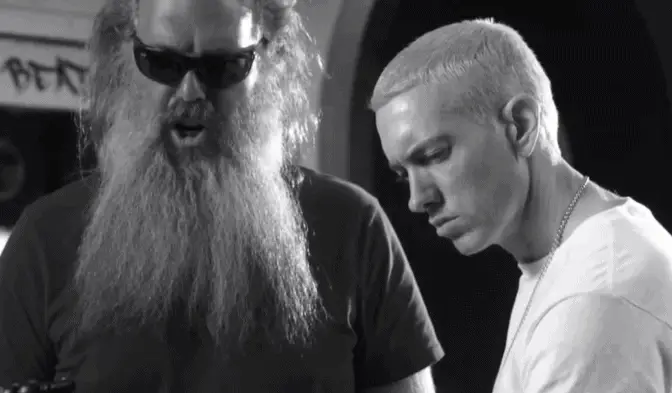Rick Rubin talks about Eminem in a new interview.
In an interview with Complex’s Rob Kenner, Co-Producer of Marshall Mathers LP 2 Rick Rubin says that Eminem is probably the Most Obsessive artist that he met in any Genre. On asking that When Eminem was talking about how excited he was to work with you, You’ve worked with so many great MCs, how does he compare to all the others? Does he remind you of anybody?
Rick Rubin has been in the game for a long time. What do you know about T-La Rock & Jazzy Jay’s “It’s Yours”? That was the 1984 12-inch on Partytime Records that prompted a teenage Russell Simmons to seek out the producer who created it. Much to his surprise, the culprit turned out to be a white NYU freshman.
Simmons and Rubin will shortly team together to form Def Jam Records in Rubin’s dorm room. They collaborated on such Rubin classics as L.L. Cool J’s “Rock The Bells,” Run-DMC and Aerosmith’s “Walk This Way,” and The Beastie Boys’ “Fight For Your Right,” permanently altering the trajectory of pop culture. Rubin would go on to collaborate with a diverse spectrum of musicians, including Johnny Cash, Adele, and Slayer, as well as making cameo appearances in the rap game, such as on Jay-2003 Z’s masterpiece “99 Problems.”
Rubin helped promote hip hop music with the Beastie Boys, LL Cool J, Public Enemy, Geto Boys, and Run-DMC. He has created a number of top-selling acts in various genres, such as heavy metal (Danzig, Slayer), alternative rock (Red Hot Chili Peppers, Weezer), and country (Johnny Cash, Dixie Chicks).
MTV dubbed Rubin “the most significant producer of the last 20 years” in 2007, and he was named one of Time’s “100 Most Influential People in the World” the same year.
Rick Says, “He doesn’t. And I would say that he is probably the most obsessive artist, maybe, that I have met in any genre. He is very, very dedicated to his craft. To the point to where it seems like there is nothing else in his life. It truly is a 24-7 thing for him. One of the reasons that many artists make good records when they’re young and then as they grow up, maybe they’re not doing their best work anymore, is because especially if you’re successful other things in life take over. Whether it’s family life or just other interests. It just happens.”
“When you make a record when you’re 19 and then you‘re making a record when you’re 40, usually when you’re 40 there are other things in your life that are more important than music by that time. When you’re 19 it might be the most important thing in your life. I would say Em’ is unusual in that he’s a grown-up who is as dedicated and focused on music as… I can’t imagine he was ever more so at any other time because it’s full-on all the time, 24 hours a day. Whether he’s working on a record, not working on a record, he’s writing all the time. Full time.”

“We were just talking about it the other day.” He said, “I write constantly, to the point where while I’m writing in my books I know 95 percent of this stuff, 98 percent of it’s never gonna get used. But by writing all the time it’s like I’m sharpening my tools. And I’m more able to draw upon that skill-set when needed. And sometimes a reference that I wrote two years ago might come back and find it’s way into a record completely unrelated just because I was doing this homework and coming up with a new rhyme scheme or just hearing a word I liked and thinking about how that could rhyme. And there might not be any context for it. But then I might be working on a song years later and think, ‘Oh, maybe that phrase could work in this context.'” And it’s like that always. There is no time off. And it’s really unusual. I’ve never met another rapper like that, who is so on. So on and so obsessed. It’s No. 1 in his life. Period. That’s it.”
Rick also said that Eminem is not just a rapper, he’s also a producer. “We worked like a tag team. We had two rooms set up at the Shangri-la Studio in Malibu. In one room we were building beats and in the other room he was doing vocals. Anytime he would have a vocal thing together, he’d bring it in and play it for me and we would talk about it. Anytime I would have a new version of a beat or change in a beat or further developed a beat, I would call him in and he would listen to it and say what he liked and what he didn’t. We just kinda worked together, back and forth.”

Rick Rubin also calls Eminem’s “The Marshall Mathers LP” his favorite Marshall’s album and he said that “I just think he’s a one-of-a-kind MC. And he’s first and foremost an MC. That’s it. I’ve had other great rappers ask me how he does what he does. You know, how does he do that? And I mean really great rappers. It really is him, and it’s natural. And a lot of his greatness come from his work ethic. It’s just on. It’s really an obsession.”
Rick Rubin has been around for a long time. What do you know about T-La Rock & Jazzy Jay’s “It’s Yours”? That was the Partytime Records 12-inch from 1984 that led a young Russell Simmons on a search for the producer who created it. The responsible culprit turned out to be a white NYU undergrad, much to his surprise.
Simmons and Rubin will shortly team up to form Def Jam Records in Rubin’s dorm room. They collaborated on such Rubin classics as LL Cool J’s “Rock The Bells,” Run-DMC & Aerosmith’s “Walk This Way,” and The Beastie Boys’ “Fight For Your Right,” permanently altering the trajectory of pop culture. Rubin would go on to collaborate with a diverse spectrum of musicians, including Johnny Cash, Adele, and Slayer, as well as making cameo appearances in the rap game, such as on Jay-2003 Z’s masterpiece “99 Problems.”
This year, the bearded Buddha of beats has been more of a presence in hip-hop than any other since leaving Def Jam: he played a critical part in Kanye West’s groundbreaking album Yeezus, and he just co-executive produced Eminem’s victorious The Marshall Mathers LP 2 with Dr. Dre. (No, Rubin did not work on Jay-Z’s Magna Carta…Holy Grail, despite the fact that he was reclining on the sofa in the commercial.) We’ve previously heard how excited Em was to work with the man he refers to as “Yoda,” now sit back and listen to Rubin’s take on working with Slim Shady.
Courtesy: Complex








